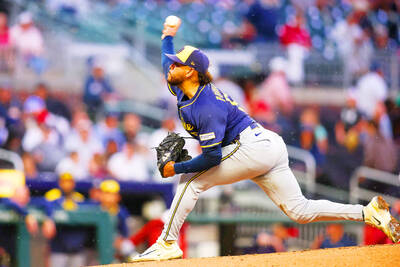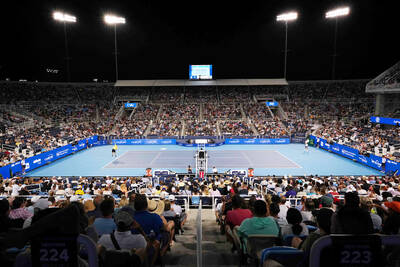China’s No. 2 tennis player, Zheng Jie, has no plans to return to the state sports system and is happy with her first year of self-management despite the extra effort it entailed.
Along with compatriots Li Na, Yan Zi and Peng Shuai, the 26-year-old was this year freed from the obligation to be managed by the China Tennis Association (CTA), and pay 65 percent of her winnings for the privilege.
CTA chief Sun Jinfang said last month she thought Zheng was in decline and, like other “less talented and more hardworking” players, would be better off back inside the national system.
Zheng, who finished last season ranked 35th in the world with US$534,172 in winnings, said it was inevitable that the first year of managing herself would have been a learning experience.
“I am one of the first to try this and in the first year, I crossed the river feeling the stones,” Zheng told China Weekly magazine. “My obligation is to try my best to get good results. As to whether I am suitable for self-management, I am not sure what is the standard we judge by, ranking or prize money?”
RESULTS
Zheng was the first Chinese player to reach the last four of a Grand Slam when she lost in the semis at Wimbledon last year, and followed that up with a doubles bronze at the Beijing Olympics.
After six years as a professional having all her playing schedule, travel, equipment and coaching arranged and paid for by the CTA, Zheng must now sort it out for herself.
“It is even more tiring to train myself,” said the Sichuanese, who has chosen her husband as her coach. “In the past when I was young I was only told by the coach and leaders what to do. Now I am grown up, I choose my own tournaments. Now I think more about wanting to play well. I am playing for myself.”
LOSS OF SECURITY
Zheng said that although she was comfortable with the new deal, under which she pays just 8 percent of her winnings to the state system, there was a potential downside in the loss of security.
“Self management means great freedom as well as great risk,” she said. “For example, I made good money in 2009, but I have to maintain my performance every year to ensure my income. There will be a big loss if I drop in ranking or injured. In the past, such loss would be taken by the state system.”
With the average annual salary in cosmopolitan Beijing being just US$6,500, the US$187,000 Zheng pocketed after tax in the first six months of this year should alone keep her comfortable for the foreseeable future.

Jobe Bellingham on Tuesday admitted to having “anxieties” on following in brother Jude’s footsteps after joining Borussia Dortmund in the summer. Jobe Bellingham, 19, is two years younger than Jude Bellingham, who joined Real Madrid in 2023 after three years at Dortmund. A centerpiece of the England national team, Jude Bellingham has emerged as one of the best players in the world in recent seasons. The younger Jobe Bellingham joined Dortmund in June from Sunderland after their promotion to the English Premier League. He admitted he understood what the perception would be ahead of the move to Germany. “It’s something you do think about.

Before Tuesday’s 7-2 win at the Atlanta Braves, Milwaukee Brewers manager Pat Murphy suggested “most people couldn’t tell you five players on our team.” A look at the standings would indicate more Brewers players soon will be recognized by more fans. After all, it is difficult to overlook a team that not only continues to extend their lead in the National League Central, but also boasts the best record in the majors. “What we’re doing in here right now is special,” right-handed pitcher Freddy Peralta said after allowing only four hits and one run in five innings, while setting a career high with

A baseball team from New Taipei City won the US Pony Palomino Division World Series yesterday in Laredo, Texas, defeating the US West representative team from Azusa, California, 2-1. Ku-Pao Home Economics and Commercial High School earned the right to represent Taiwan in the Pony Palomino (17 to 18 age group) World Series after winning this year's Wang Chen-chih Cup, a competition named after Taiwanese-Japanese baseball legend Wang Chen-chih (王貞治), also known as Sadaharu Oh. In the championship game against Azusa, Ku-Pao's starting pitcher Luo Yu-yan (羅于晏) was erratic early, giving up two hits in the bottom of the first inning, followed

NEXT ROUND: World No. 1s Jannik Sinner and Aryna Sabalenka opened their title defenses with straight-sets wins, while Iga Swiatek and Taylor Fritz also advanced Jannik Sinner and Aryna Sabalenka got their title defenses off to smooth starts as they powered into the third round of the ATP-WTA Cincinnati Open on Saturday. The men’s and women’s top seeds, each ranked No. 1 in the world, were both competing for the first time since Wimbledon, where Sinner lifted the title and Sabalenka bowed out in the women’s semi-finals. Sinner crushed Colombian Daniel Elahi Galan 6-1, 6-1 in steamy afternoon weather, while Sabalenka beat 2023 Wimbledon champion Marketa Vondrousova 7-5, 6-1 under the lights of the night session. Sabalenka needed 54 minutes and a service break in the final game